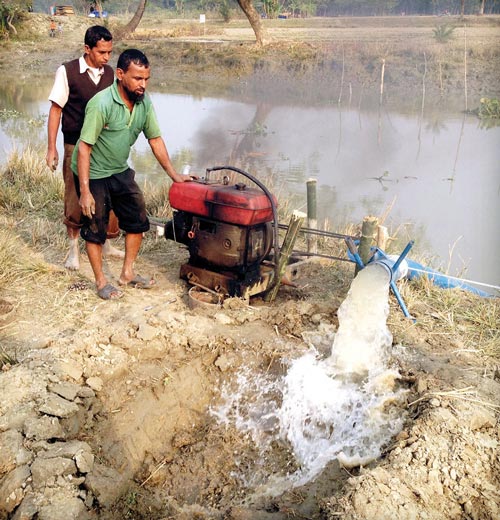 Bangladesh has a mosaic of distinct agricultural seasons, potentially allowing farmers to cultivate two and sometimes three crops on the same field. However, in the impoverished region of Southern Bangladesh, only 50% of farmers currently grow more than one rainy season rice crop per year, a situation highly problematic for the world’s most densely populated country, where agricultural land is shrinking by 1% per year as urbanization accelerates.
Bangladesh has a mosaic of distinct agricultural seasons, potentially allowing farmers to cultivate two and sometimes three crops on the same field. However, in the impoverished region of Southern Bangladesh, only 50% of farmers currently grow more than one rainy season rice crop per year, a situation highly problematic for the world’s most densely populated country, where agricultural land is shrinking by 1% per year as urbanization accelerates.
The main limitations to increased cropping intensity are the procurement of irrigation during the dry season, the high cost of agricultural labor, and delays in rice harvesting that set back timely planting of the subsequent dry season wheat, maize, or legume crop. As population, and thus future cereals demand, grows, overcoming these constraints is becoming an increasingly pressing issue. For these reasons, CIMMYT works closely with public and private sector partners, local agricultural service providers, and farmers to encourage efficient agricultural mechanization, irrigation, and conservation agriculture (CA).
To raise awareness of CIMMYT’s work on sustainable crop intensification in Southern Bangladesh, CIMMYT-Bangladesh, in association with International Development Enterprises (iDE), hosted a field day in Kramji Char, Barisal, on 17 January 2013. The visit showcased activities of the EU-funded Agriculture, Nutrition and Extension Project (ANEP), as well as the USAID-funded Cereal Systems Initiative for South Asia in Bangladesh (CSISA). CIMMYT was honored by the presence of a number of high-level public and private sector dignitaries, including Monzur Hossain (Ministry of Agriculture Secretary), Paul Sabatine (USAID-Bangladesh deputy mission director), Nazmul Islam (Bangladesh Agricultural Development Corporation chairman), Wais Kabir (Bangladesh Agricultural Research Council executive chairman), Krishibid Mukul Chandra Roy (Department of Agricultural Extension director general), Ahsan Khan Chowdhury (PRAN-RFL Group deputy managing director), and Anar Khalilov (USAID-Bangladesh senior food security advisor).
CIMMYT’s work in Kramji Char and much of Southern Bangladesh focuses on the sustainable provision of low-cost, fuel-efficient surface water irrigation using Axial Flow Pump (AFP) technologies, which can provide up to 46% more water per drop of diesel fuel consumed by diesel pumping. CIMMYT also popularizes the use of agricultural machineries with CA such as seeder-fertilizer drills, bed planters, and reapers that can be attached to two-wheel hand tractors. These implements enable more efficient planting and irrigation water use, while reducing labor requirements and saving farmers costs. Working with iDE, CIMMYT is developing business models for private sector and local machinery service provider partners to ensure farmers’ access to CA services at low-cost. At the completion of the field day, the Secretary of Agriculture concluded that “the demonstration of these machineries opens the door to increased crop productivity and farmers’ income.”
The field day was jointly organized by CIMMYT’s Timothy J. Krupnik, Yusuf Ali, Samina Yasmin, TP Tiwari, and Andrew McDonald. The event’s success would not have been possible without the valuable coordination and contribution of CIMMYT’s iDE partners, notably Rajiv Pardhan (Bangladesh country director), Nurul Amin (operations manager), Afzal Hossain Bhuiyan (business development specialist), and Richard Rose (ANEP Project Manager).
 Climate adaptation and mitigation
Climate adaptation and mitigation